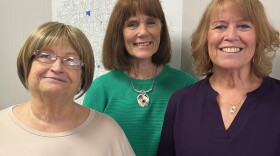For the first time, low-income people in Kansas and Missouri can buy health insurance on the federal exchange throughout the year.
The new year-round enrollment period applies to those who earn 150% or less of the federal poverty line — meaning up to $39,750 for a family of four.
A pandemic stimulus law passed by Congress last year also offers more financial help to many people who buy coverage on Healthcare.gov.
In Kansas, here’s what that translates to: People who earn between 100% and 150% of the federally defined poverty level can get enough subsidies to fully cover the premiums of certain insurance plans.
Low-income Missourians may qualify for subsidies, too, but many could qualify for Medicaid under the state’s expanded program.
Sign-ups will continue
Normally, sign-ups for health insurance through Healthcare.gov happen each fall. But during the COVID-19 pandemic, the Biden administration expanded opportunities for people to get covered.
HealthCare.gov will tweak its website this month so that people who earn up to 150% of the poverty level can continue to shop for a 2022 health plan, even though the regular enrollment period is finished.
Kansans who want to check whether they qualify for subsidies and understand their options can get help from a trained navigator near them.
Navigators don’t charge for that service and don’t accept commissions from insurance companies to steer you to specific products. They can help explain subsidies, insurance premiums, deductibles, copays and other details that are fundamental to picking a health plan.
Juven Nava leads a team of bilingual experts at GraceMed Health Clinic who offer the service. If people have any uncertainty about their options, he says they should feel free to call.
Navigators recommend that people review their insurance options every year because their subsidy eligibility can change, and so can the plan options in their area.
“It could be someone who perhaps either works for a small business that isn’t being offered employer health insurance, it could be someone that’s working multiple part-time jobs,” Nava said.
The pandemic-related boost to subsidies means many low-income people can get certain silver-level plans without a monthly premium.
This year, the federal exchange includes more plans than ever for Kansas – 123 policies offered by seven different insurers. Options vary by county, and include local options like Blue Cross Blue Shield of Kansas and national insurers like Cigna.
The Kansas Health Institute says that as of 2019, more than a quarter-million people in the state had no health insurance.
Kansas is one of 12 states that have not expanded Medicaid to cover more low-income people.
Celia Llopis-Jepsen reports on consumer health for the Kansas News Service. You can follow her on Twitter @celia_LJ or email her at celia (at) kcur (dot) org.
The Kansas News Service is a collaboration of KCUR, Kansas Public Radio, KMUW and High Plains Public Radio focused on health, the social determinants of health and their connection to public policy.
Kansas News Service stories and photos may be republished by news media at no cost with proper attribution and a link to ksnewsservice.org.
Copyright 2022 KCUR 89.3. To see more, visit KCUR 89.3. 9(MDA4OTAxNzAzMDEzMjc0MTc2MzA5ZDZlMw004))








